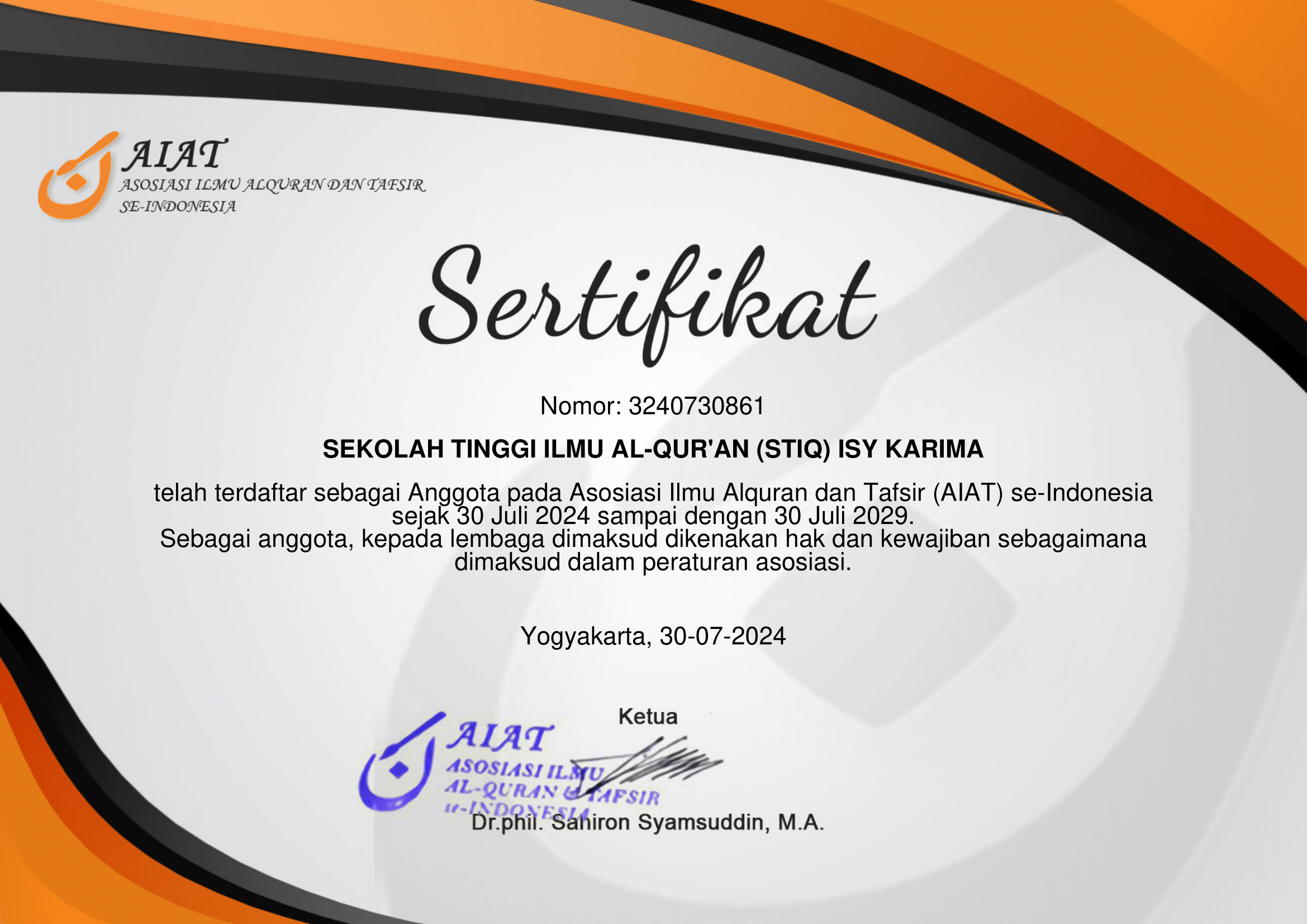Counterproductive Method of Hermeneutics as The Tafsir Al-Qur’an Studies
DOI:
https://doi.org/10.58438/alkarima.v1i2.79Keywords:
Contraproductive, Hemeunetics, TafsirAbstract
Hermeneutics is the philosophy of interpretation that originated from the tradition of Bible interpretation. Among Muslim scholars, there is a mindset of interpreting the Qur’an that clearly adopts the hermeneutic method. Muslim scholars who support this adoption work believe that this method can bring changes to the method of Qur’anic interpretation, which they have long considered stagnant. The Qur’an, as a sacred scripture, is revered and used as a guide for life by Muslims. The Qur’an is the word of God, revealed to Prophet Muhammad (peace be upon him) through the Angel Gabriel for humanity in this world. The adoption of the hermeneutic theory is seen as the initiator of a new interpretation method. Hermeneutics, as an interpretation method, is highly counterproductive with the salaf al-salih scholars in understanding the message of the Qur’an, so that the subtlety of intelligence (accuracy of understanding) and the subtlety of explication (accuracy of explanation) of the verses of Allah can be traced comprehensively.
Hermeneutika merupakan filsafat penafsiran yang lahir dari tradisi intepretasi Bible. Di kalangan cendekiawan Muslim terdapat mindset penafsiran Al-Qur’an yang tampak sekali mengadopsi metode hermeneutika. Cendekiawan Muslim yang mendukung kerjakerja adopsi ini yakin bahwa metode ini mampu membawa perubahan dalam metode penafsiran Al-Qur’an yang selama ini mereka anggap jumud. Al-Quran sebagai kitab suci yang disakralkan dan dijadikan pegangan hidup oleh umat Islam. Al-Quran adalah kalam Ilahi, diturunkan kepada Nabi Muhammad saw. melalui Malaikat Jibril bagi umat manusia di dunia ini. Pengadopsian terhadap teori hermeneutika itu dianggap pencetus metode tafsir baru. Hermeneutika sebagai sebuah metode interpretasi yang sangat kontraproduktif dengan para ulama salaf al-shalih dalam memahami pesan Al-Quran agar subtilitas intelegensi (ketepatan pemahaman) dan subtilitas ecsplicansi (ketepatan penjabaran) dari ayat-ayat Allah bisa ditelusuri secara komprehensif.
Downloads
References
Aref Ali Nayed. 1994. “Interpretation as Opera- tion Artifact Bindings: Operation Herme- neuticsâ€. (Doctoral Dissertation at Guelph University) 3.
Friedrich D. E. Schleiermacher. 1992. “General Hermeneutics,†Pen. J. Duke dan J. Forst- man dalam The Hermeneutics Reader: Texts of the German Tradition from the Enlightenment to the Present, Ed. Kurt Mueller-Vollmer. New York: The Contin- uum Publishing Company.
Hamid Fahmy Zarkasyi. 2008. “Hermeneutics As a Product of Life Viewâ€. Paper 4/15/
Hans-Georg Gadamer. 1977. Philosophical Hermeneutics. California: University of California Press.
Joel, C. Weinsheimer. 1985. Gadamer’s Hermeneutics: A Reading of Truth and Method. New Haven and London: Yale University Press.
John H. Hayes. 1979. An Introduction to Old Testament Study. Tennessee: Abingdon.
Josef Bleicher. 1990. Contemporary Herme- neutics: Hermeneutics As Method, Phi- losophy And Critique. London and New York: Routledge.
Moch., Nur Ichwan. 2003. Meretas Kesarja- naan Kritis Al-Qur’an: Teori Hermeneu- tika Al-Qur’an. Jakarta: Teraju.
Mohammed Arkoun. 2001. “Contemporary Critical Practices and the Qur’an,â€. En- cyclopaedia of the Qur’an. Netherlands: Brill.
Mohammed Arkoun. 2001. “Introduction: An Assessment of and Perspectives on the Study of the Qur’an,â€. The Qur’an: Style and Contents. Aldershoot: Ashgate.
Mohammed Arkoun. 1997. “Rethinking Islam Todayâ€. Mapping Islamic Studies: Ge- nealogy, Continuity and Change. Berlin: Mouton de Gruyter.
Mohammed Arkoun. 1995. Min Faysal Al- Tafriqah ila Fasl Al-Maqal: ‘Ayna Huwa Al-Fikr Al-Islami Al-Mu‘asir. Beirut: Dar Al-Saqi.
Mohammed Arkoun. 1994. Rethinking Islam: Common Questions, Uncommon Answers. Colorado: Westview Press, Inc.
Mohammed Arkoun. 2002. The Unthought in Contemporary Islamic Thoughts. London: Saqi Books.
Nasr Hamid Abu Zayd. 1999. “The Moderniza- tion of Islam or the Islamization of Mo- dernityâ€. Cosmopolitanism, Identity and
Authenticity in the Middle East. Surrey: Curzon Press.
Nasr Hamid Abu Zayd. 1992. Naqd Al-Khitab Al-Dini. Kairo: Sina li Al-Nashr.
Paul Ricoeur. 1972. Hermeneutics and the Hu- man Sciences: Essays on Language, Ac- tion and Interpretation. New York: Abing- don Press.
Theodore Planting. 1992. Historical Under- standing in the Thought of Wilhelm Dil- they. United Kingdom: Edwin Ellen Press, Ltd.
Werner G., Jeanrond. 1991. Theological Hermeneutics: Development and Signifi- cance. London: Macmillan Academic and Professional LTD.
Werner, Georg Kümmel.1972. The New Testa- ment: The History of the Investigation of Its Problems. Tennessee: Abingdon Press.
Downloads
Published
How to Cite
Issue
Section
License
This work is licensed under a Creative Commons Attribution-ShareAlike 4.0 International License.












